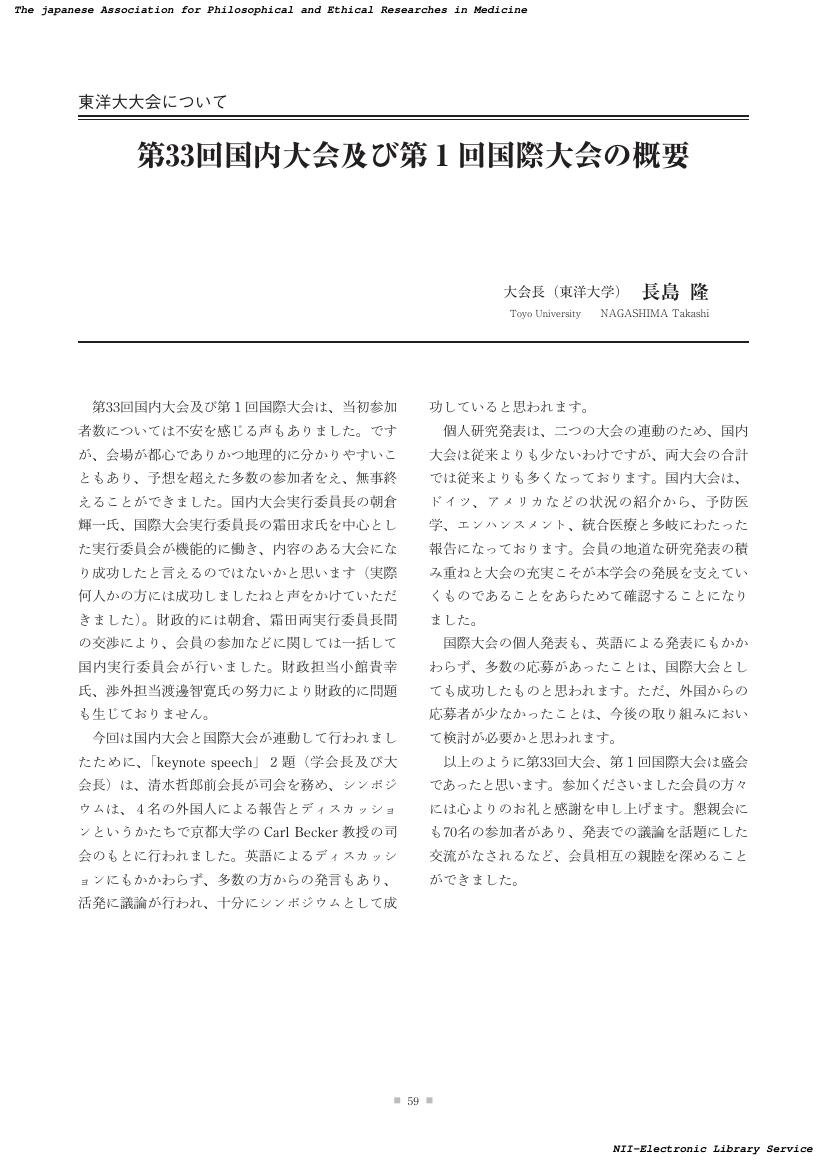1 0 0 0 OA フィヒテとシェリング : 実在の根拠をめぐって
- 著者
- 長島 隆
- 出版者
- 東北哲学会
- 雑誌
- 東北哲学会年報 (ISSN:09139354)
- 巻号頁・発行日
- vol.14, pp.62-63, 1998-04-30 (Released:2018-02-28)
1 0 0 0 OA 第33回国内大会及び第1回国際大会の概要(東洋大大会について)
- 著者
- 長島 隆
- 出版者
- 日本医学哲学・倫理学会
- 雑誌
- 医学哲学 医学倫理 (ISSN:02896427)
- 巻号頁・発行日
- vol.33, pp.59, 2015-09-30 (Released:2018-02-01)
1 0 0 0 OA グローバル時代における地域医療と医療倫理 : 3.11以後の時代に(国際大会 基調講演)
- 著者
- 長島 隆
- 出版者
- 日本医学哲学・倫理学会
- 雑誌
- 医学哲学 医学倫理 (ISSN:02896427)
- 巻号頁・発行日
- vol.33, pp.66-73, 2015-09-30 (Released:2018-02-01)
1 0 0 0 OA シェリング「生命」論と医学 : アルプレヒト・フォン・ハラーとアンドレアス・レシュラウプ
- 著者
- 長島 隆
- 出版者
- 日本医学哲学・倫理学会
- 雑誌
- 医学哲学 医学倫理 (ISSN:02896427)
- 巻号頁・発行日
- vol.8, pp.52-64, 1990-07-31 (Released:2018-02-01)
Schelling's philosophy of nature has two sources, one is Kantian and Fichtian transcendental philosophy, the other is the contemporary natural science of his time. In this essay, I discuss Schelling's life-concept against the background of the medical dispute of Brown's "lrritabilitat (Erregbarkeit)-Lehre" in Germany at the turn of the 19th century. Schelling's central interest in life-organisation is the individual mediating his environment. In this context, he accepts Brown's "lrritabilitat-Lehre" through Roschlaub's revision of it and A. v. Haller's concept of "Sensibilitat". So he criticizes its "Ungegrundetsein" and develops it into his triad of Erregbarkeit-Sensibilitat-Bild- ungstrieb. He then inserts this triad into his theory of nature.
1 0 0 0 OA Weltalterの研究動向とマルクス・ガブリエルのシェリング研究
- 著者
- 長島 隆
- 出版者
- 東洋大学交際哲学研究センター
- 雑誌
- 国際哲学研究 = Journal of International Philosophy (ISSN:21868581)
- 巻号頁・発行日
- no.別冊5, pp.142-160, 2014-10-31
1 0 0 0 OA 個体性の形而上学(その 2) : ヘーゲル自然哲学の根本性格
- 著者
- 長島 隆
- 出版者
- 日本医科大学
- 雑誌
- 日本医科大学基礎科学紀要 (ISSN:0389892X)
- 巻号頁・発行日
- vol.12, pp.1-20, 1992-03-31
1 0 0 0 OA 個体性の形而上学 : ヘーゲル自然哲学の根本性格(その 1)
- 著者
- 長島 隆
- 出版者
- 日本医科大学
- 雑誌
- 日本医科大学基礎科学紀要 (ISSN:0389892X)
- 巻号頁・発行日
- vol.11, pp.31-46, 1991-03-31
昨年度に引き続き本年度は、哺乳類胚発生のメカニズムならびに胚の個体発生能を含めた質的ポテンシャルを、非侵襲的に解明し評価することを目的とした。そのために、マウス胚発生過程において培養液中に分泌されるタンパク質のプロファイル(secretome)を明らかにし、そのデータベース構築を目指すとともに、agingや機械的受精操作などがsecretomeにどのような影響を及ぼすかについて検討するための実験システムの整備を行った。まず、secretomeと胚発生・発育の関連を検討する際に、十分な胚盤胞到達率が得られなければならない。一方、プロテインチップ解析に供するためには、出来るだけ少量の培養液で行う必要があり、これは胚発生・発育にとって厳しい環境となる。このように、両者は相反するため、至適条件の確立が極めて重要である。そこで、培養液の変更など種々の検討を行った結果、60μ1の培養液量で約90%の胚盤胞到達率を再現性良く得られる培養システムを確立し、引き続いてその実験システムにより得られた各時期の培養液をプロテインチップ解析に供した。その結果、コントロール培養液に比較して、胚存在下の培養液では、複数の特異的蛋白ピークが検出され、また時期に応じてそのプロファイルは変化した。これらの一連のsecretomeのプロファイリングと胚盤胞到達率との関連を検討するとともに、今回検出された複数の特異的蛋白の同定を目指し、MALDI/TOF-MS質量分析計への解析に供するに必要な実験システムの更なる構築を行った。昨年度より引き続いて本年度得られた上記の成果は、マウスのみならずヒト胚のqualityの非侵襲的評価システムを確立するうえで、重要な基盤データになると考えられる。




